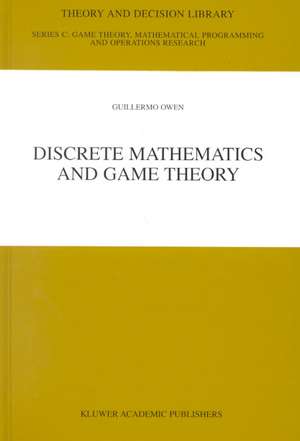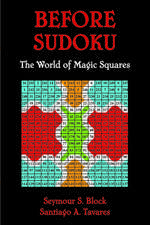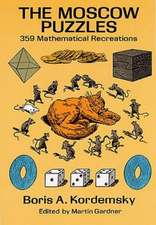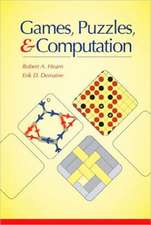Discrete Mathematics and Game Theory: Theory and Decision Library C, cartea 22
Autor Guillermo Owenen Limba Engleză Hardback – 30 noi 1999
The volume is divided into seven chapters. Chapter I presents a brief review of the solution of systems of linear equations by the use of matrices. Chapter III introduces the theory of probability. The rest of the book deals with new developments in mathematics such as linear and dynamic programming, the theory of networks and the theory of games. These developments are generally recognized as the most important field in the `new mathematics' and they also have specific applications in the management sciences.
| Toate formatele și edițiile | Preț | Express |
|---|---|---|
| Paperback (1) | 1214.24 lei 6-8 săpt. | |
| Springer Us – 8 oct 2012 | 1214.24 lei 6-8 săpt. | |
| Hardback (1) | 1220.39 lei 6-8 săpt. | |
| Springer Us – 30 noi 1999 | 1220.39 lei 6-8 săpt. |
Din seria Theory and Decision Library C
-
 Preț: 388.13 lei
Preț: 388.13 lei - 15%
 Preț: 642.51 lei
Preț: 642.51 lei - 18%
 Preț: 952.40 lei
Preț: 952.40 lei - 15%
 Preț: 648.24 lei
Preț: 648.24 lei - 18%
 Preț: 1227.36 lei
Preț: 1227.36 lei - 15%
 Preț: 643.00 lei
Preț: 643.00 lei - 15%
 Preț: 641.53 lei
Preț: 641.53 lei - 15%
 Preț: 640.88 lei
Preț: 640.88 lei - 15%
 Preț: 645.60 lei
Preț: 645.60 lei - 18%
 Preț: 951.77 lei
Preț: 951.77 lei - 15%
 Preț: 644.82 lei
Preț: 644.82 lei - 18%
 Preț: 952.89 lei
Preț: 952.89 lei - 18%
 Preț: 1391.52 lei
Preț: 1391.52 lei - 18%
 Preț: 953.82 lei
Preț: 953.82 lei -
 Preț: 395.25 lei
Preț: 395.25 lei - 15%
 Preț: 639.73 lei
Preț: 639.73 lei - 18%
 Preț: 1840.11 lei
Preț: 1840.11 lei - 18%
 Preț: 946.72 lei
Preț: 946.72 lei - 18%
 Preț: 1222.17 lei
Preț: 1222.17 lei - 15%
 Preț: 645.60 lei
Preț: 645.60 lei - 15%
 Preț: 638.11 lei
Preț: 638.11 lei - 15%
 Preț: 645.47 lei
Preț: 645.47 lei - 15%
 Preț: 646.94 lei
Preț: 646.94 lei - 18%
 Preț: 952.72 lei
Preț: 952.72 lei - 18%
 Preț: 952.89 lei
Preț: 952.89 lei
Preț: 1220.39 lei
Preț vechi: 1488.29 lei
-18% Nou
Puncte Express: 1831
Preț estimativ în valută:
233.55€ • 253.60$ • 196.18£
233.55€ • 253.60$ • 196.18£
Carte tipărită la comandă
Livrare economică 22 aprilie-06 mai
Preluare comenzi: 021 569.72.76
Specificații
ISBN-13: 9780792385110
ISBN-10: 079238511X
Pagini: 346
Ilustrații: VI, 346 p.
Dimensiuni: 155 x 235 x 21 mm
Greutate: 0.68 kg
Ediția:1999
Editura: Springer Us
Colecția Springer
Seria Theory and Decision Library C
Locul publicării:New York, NY, United States
ISBN-10: 079238511X
Pagini: 346
Ilustrații: VI, 346 p.
Dimensiuni: 155 x 235 x 21 mm
Greutate: 0.68 kg
Ediția:1999
Editura: Springer Us
Colecția Springer
Seria Theory and Decision Library C
Locul publicării:New York, NY, United States
Public țintă
ResearchCuprins
I. Vectors and Matrices.- 1. Algebraic Operations.- 2. Row Operations and the Solution of Systems of Linear Equations.- 3. Solution of General m×n Systems of Equations.- II. Linear Programming.- 1. Linear Programs.- 2. The Simplex Algorithm: Slack Variables.- 3. The Simplex Tableau.- 4. The Simplex Algorithm: Objectives.- 5. The Simplex Algorithm: Choice of Pivots.- 6. The Simplex Algorithm: Stage I..- 7. The Simplex Algorithm: Proof of Convergence.- 8. Equation Constraints.- 9. Degeneracy Procedures.- 10. Some Practical Comments.- 11. Duality.- 12. Transportation Problems.- 13. Assignment Problems.- III. The Theory of Probability.- 1. Probabilities.- 2. Discrete Probability Spaces.- 3. Conditional Probability.- 4. Compound Experiments.- 5. Bayes' Formula.- 6. Repetition of Simple Experiments; The Binomial Distribution.- 7. Drawings with and without Replacement.- 8. Random Variables.- 9. Expected Values. Means and Variances.- 10. Rules for Computing the Mean and Variance.- 11. Two Important Theorems.- 12. Markov Chains.- 13. Regular and Absorbing Markov Chains.- IV. The Theory of Games.- 1. Games: Extensive and Normal Form.- 2. Saddle Points.- 3. Mixed Strategies.- 4. Solution of 2×2 Games.- 5. 2×n and m×2 Games.- 6. Solutions by Linear Programming.- 7 Solution of Games by Fictitious Play.- 8. The von Neumann Model of an Expanding Economy.- 9. Existence of an Equilibrium Expansion Rate.- 10. Two-Person Non-Zero-Sum Games.- 11. Evolutionary Stable Systems.- V. Cooperative Games.- 1. n-Person Games.- 2. The Core.- 3. The Shapley Value.- 4. Voting Structures.- VI. Dynamic Programming.- 1. The Principle of Maximality.- 2. The Fixed-Charge Transportation Problem.- 3. Inventories.- 4. Stochastic Inventory Systems.- VII. Graphs and Networks.- 1. Introduction.- 2. CriticalPath Analysis.- 3. The Shortest Path through a Network.- 4. Minimal Spanning Trees.- 5. The Maximal Flow in a Network.















